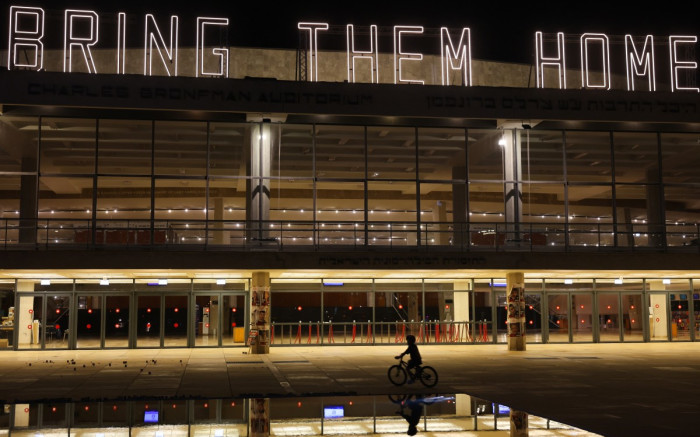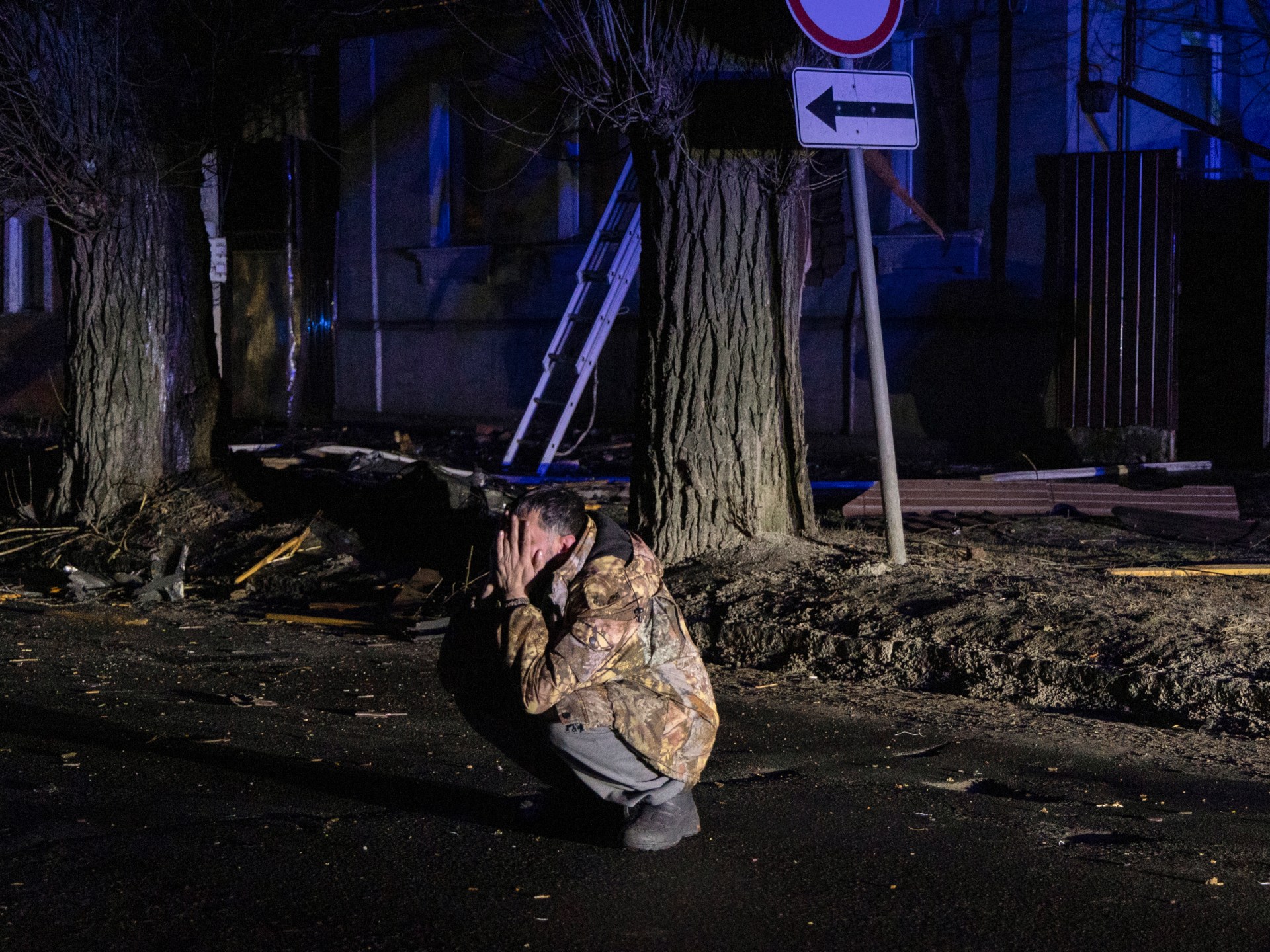
Hamas released a statement welcoming the “humanitarian ceasefire” and said it would also provide for the release of 150 Palestinians from Israeli prisons.
A sign illuminates a square in Tel Aviv calling for the release of Israelis held hostage in the Gaza Strip since Hamas militants attacked on November 21, 2023, amid ongoing fighting between Israel and the Palestinian armed group. Image: AFP
JERUSALEM – Israel and Hamas announced a deal on Wednesday allowing the release of at least 50 hostages and scores of Palestinian prisoners while offering a four-day ceasefire to beleaguered residents of the Gaza Strip after weeks of war.
In the first major diplomatic breakthrough in the war, Israel, Hamas, the United States and Qatar outlined in a series of statements a carefully crafted agreement that had been in the works for weeks.
Under the Qatar-brokered deal, Palestinian militants will release 50 women and children abducted during their Oct. 7 raids that Israel said killed 1,200 people, most of them civilians.
A senior U.S. official said three Americans, including 3-year-old Abigail Mor Idan, were among 50 people scheduled for staggered release starting Thursday.
Qatar’s Foreign Ministry confirmed the agreement, saying that “a number of Palestinian women and children detained in Israeli prisons” would be released in exchange for the hostages.
“The start of the pause will be announced within the next 24 hours and will last four days, subject to extension,” the ministry said in a statement.
Hamas and other Palestinian militant groups are believed to be holding an estimated 240 Israelis and foreigners hostage in Gaza.
Israel said it would begin a four-day “pause” in its six-week-old air, land and sea assault on Gaza to facilitate the release of hostages, but stressed it did not mean the end of the war.
For every 10 more hostages released, there would be an additional day of “break,” the Israeli government said.
Hamas released a statement welcoming the “humanitarian ceasefire” and said it would also provide for the release of 150 Palestinians from Israeli prisons.
“The resistance is committed to the ceasefire as long as the occupation respects it,” a Hamas official told AFP.
Sources from Hamas and Islamic Jihad, another militant group involved in the October 7 attacks, had previously told AFP that the ceasefire would include a ground ceasefire and a pause in Israeli air operations over the southern Gaza Strip.
In retaliation for the worst attacks in its history, Israel launched Operation Swords of Iron in Gaza, promising to secure the release of the hostages and destroy Hamas.
According to the Hamas government in Gaza, the war has killed 14,100 people, including thousands of children.
Israeli Prime Minister Benjamin Netanyahu’s cabinet approved the deal on Wednesday after a nearly all-night meeting in which he told reticent ministers it was a “difficult but a right decision.”
The Cabinet’s approval was one of the final stumbling blocks after five “extremely torturous” weeks of talks between the U.S. Central Intelligence Agency, Israel’s foreign intelligence service Mossad, Egyptian intelligence and leaders in Doha, Cairo, according to a U.S. official called. Washington, Gaza and Israel.
Consider
Ahead of the Cabinet vote, Netanyahu faced a revolt within his right-wing coalition that some believe gave too much to the Palestinian militants they wanted to destroy.
Hardline National Security Minister Itamar Ben-Gvir signaled he would vote against the deal, saying it must include the release of Israeli soldiers also captured by Hamas.
But with dozens of families in Israel desperately waiting for their loved ones to return home and the Israeli public reeling from the fate of the hostages, the government ultimately put all concerns aside.
Israel’s hawkish Defense Minister Yoav Gallant said before the crucial meeting that he had received assurances that the deal would not mean the end of the war to destroy Hamas.
“Immediately after we exhaust this phase,” he said, security operations “will continue in full force.”
In a statement, the Israeli government stressed that the ceasefire agreement would not mean the end of the war in Gaza.
Israel “will continue the war to return all hostages home, complete the elimination of Hamas and ensure that there will be no new threat to the State of Israel from Gaza,” a government statement said.
“Unbearable situation”
Earlier, Gaza resident Hamza Abdel Razeq said he would welcome any ceasefire deal, hoping it would provide respite for people enduring Israel’s bombing and increasing ground offensive.
“People are really suffering,” he told AFP. “I believe it will pave the way for longer ceasefires or even a total ceasefire.”
A US official said there was also hope that the deal would lead to a “complete pause” in fighting along the Israel-Lebanese border between Israel and Hezbollah, which like Hamas is backed by Iran.
Since the beginning of the war between Israel and Hamas, there have been escalating exchanges of fire on the border, resulting in scores of people being killed on both sides.
Another Gaza resident, Mahmoud Abu Najm, said: “We… pray to God for his success because the people are enduring an unbearable situation.”
Large parts of the Gaza Strip have been leveled by thousands of airstrikes and the area is under siege with minimal access to food, water and fuel.
Six weeks into the war, Israel is under intense international pressure to enforce a humanitarian ceasefire.
But in recent days it has pushed its offensive into the northern Gaza Strip.
The Israeli military said airstrikes last day hit “around 250” Hamas targets and destroyed three underground shafts in the Jabalia area, which it said it had completely surrounded.
At Indonesia’s Jabalia hospital, the Hamas-run health ministry said strikes had killed dozens of people, but there was no independent confirmation of the number of casualties.
The Israeli army later said its troops had “directly attacked” the source of the fire at the Indonesian hospital.
Doctors Without Borders (MSF) said three doctors, including two employees, were killed in an Israeli attack on Al-Awda Hospital in Jabalia refugee camp.
Israel says Hamas uses medical facilities to hide fighters and as bases for operations, making them legitimate military targets, while stressing that it is doing everything in its power to limit harm to civilians.






Recent Comments